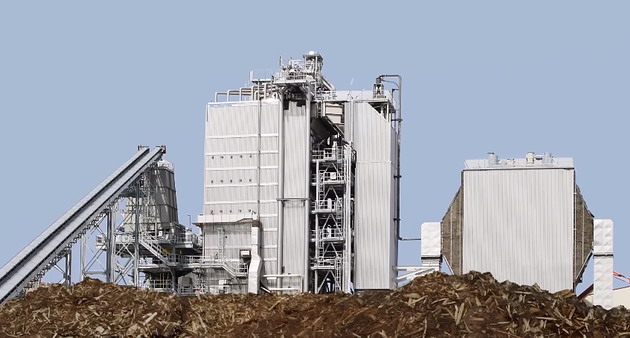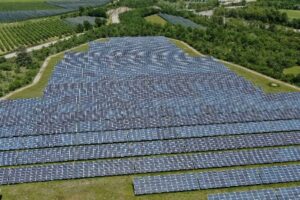Advantages And Disadvantages Of Biomass

Biomass energy is a source of renewable energy that uses wood and plant waste, municipal solid waste, organic waste generating biogas, landfill gas, but also some forms of trash to generate heat and low-carbon electricity.
Biomass Used For Heating And Power Generation
Mankind has relied on biomass to generate heat during the winter since very ancient times, but more recently, we have found that we can use different types of organic waste materials and wood waste to generate not only heat, but also electricity that is cleaner than the electricity produced by burning fossil fuels.
Biomass energy has become a part of the renewable energy sources that will replace fossil fuels in the future due to the fact that different types of waste materials (wood-based and organic) are available almost all the time (not to mention the trash that is produced in large quantities every day all over the planet).
While burning, biomass releases less harmful emissions than the fossil fuels used as conventional sources of power, and keeps the environment clean of different types of waste materials and trash.
If we use biomass as a heat source inside the house during the winter we will get heat, but at the same we will release carbon emissions, and some ash after burning.
Lately, technology has evolved and now we can turn the old power plants burning coal in power plants that are using biomass to produce cleaner heat and electricity.
Advantages of Biomass Energy
Biomass energy offers more advantages than disadvantages today, which means that biomass will become a source of clean power of the future.
1. Is A Renewable Source Of Power
Trees grow back and garbage is produced daily, which means that biomass is a never ending source of power (renewable).
Because wood waste is produced all the time, garbage and organic matter daily, we can turn all these waste products into a useful source of low-carbon electricity and heat that can power entire cities.
2. Biomass Energy Is A Cost-Effective Source Of Power
Getting biomass is much easier and cheaper than mining fossil fuels because biomass represents a waste product (wood-based, organic, trash etc.).
Generally, the only costs with biomass are represented by transportation costs (biomass needs to be transported from the forest or from the place where is produced to the power plant where will be turned into heat and low-carbon electricity.
3. Is An Abundant Resource
Today, biomass represents a wide source of natural or man-made fuels (not only wood).
Mankind has started to use wood as heat source or for cooking since ancient times, but today we have found that we can produce clean electricity burning wood waste, but also organic waste and trash, which means that biomass has become today an abundant resource for heat and electricity production.
4. Is a Low-Carbon Energy Source
Burning wood waste, landfill gas, ethanol, biodiesel, trash or other forms of biomass, produces carbon emissions, but the amount of greenhouse gases released while burning biomass is smaller than the amount of greenhouse gas emissions released while burning coal.
This might be the reason while lately, several coal-fired power plants have been turned into power plants burning biomass.
Turning an old coal-fired power plant into a power plant that burns biomass is part of the plan that aims to reduce the level of greenhouse gases released in the atmosphere for a cleaner environment.
5. Is a Great Consumer of Waste
Biomass represents several types of waste products that can be turned into heat and low-carbon electricity.
Using waste as an energy source is a great way of reducing wood waste, organic waste and trash that otherwise would decay in nature affecting the environment.
6. Is Available All Over the Planet
Biomass is produced all over the world because everywhere where we have people we gonna have trash and organic waste.
The forest has plenty of dry trees and broken branches that can be used as biomass to generate heat and low-carbon electricity.
Biomass is also available even in places where we don’t have human settlements because the forest and the wild animals living there will always produce wood waste and organic matter.
7. Reduces Our Dependence on Conventional Sources Of Power (Fossil Fuels)
Mining for coal, oil and natural gas is an expensive activity because involves a very large number of workers not only in the U.S. but in all countries of the world.
Fossil fuels are expensive because they need to recover the costs with the mining activity and the transportation from the mine to the power plant.
However, biomass is much more available worldwide (is a renewable resource) because is produced by the forest, people and animals, so the cost of the biomass is represented mainly by the transportation costs to the power plant.
Being cheaper and cleaner than fossil fuels, biomass represents a great alternative to generate cheaper heat and low-carbon electricity.
Disadvantages of Biomass Energy
Biomass energy has many advantages and only a few disadvantages, which makes it an ideal source of power for the future.
1. Is Not Very Efficient Compared To Fossil Fuels
EIA.gov says that a boiler burning biomass has an efficiency of only 24%, which is much lower than the efficiency obtained by a boiler that burns coal (33%).
A boiler burning natural gas is even more efficient (around 43%), and also releases the smallest amount of greenhouse gases while burning among all fossil fuels, which is the main reason why natural gas will become the first low-carbon energy source that will replace the dirty fossil fuels such as coal and oil as the main energy source on the planet.
2. Is Not 100% Clean
Solar and wind power are considered 100% clean (if we don’t consider the greenhouse gas emissions produced during the manufacturing, transportation and installation processes).
Burning biomass releases greenhouse gases (a smaller and less harmful amount of greenhouse gases than burning fossil fuels).
However, even if biomass releases some carbon emissions while burning, we can use this low-carbon energy source because is cleaner and cheaper than fossil fuels and is helping us to manage waste products in a better way.
3. Using Biomass as Energy Source Can Lead to Deforestation
Biomass means wood and plant waste (among other waste products), which in some areas of the planet can lead to deforestation.
The forest is providing us plenty of wood waste such as dry trees and broken branches, but some people are greedy and they start cutting trees instead of branches because they need raw materials for wood pellet production (the industry that uses boilers burning biomass (wood pellets) instead of boilers burning natural gas has become pretty popular in many countries).
We don’t need to cut the forest to get raw materials for biomass production, a large forest will provide every day plenty of branches and dry wood that can be used to produce biomass.
4. Biomass Power Plants Have High Upfront Costs
Building a power plant that burns biomass or turning a former coal-fired power plant into a power plant that burns biomass is not an easy or cheap investment.
Biomass becomes effective only after the installation process of the power plant.
Biomass represents a cheaper source of clean fuel, which means that the facility will have mainly transportation costs to bring the biomass at the power plant.
If the supply of biomass is ensured, the power plant will produce biomass energy for decades.
Final conclusion
Biomass energy alone, cannot replace the energy produced by fossil fuels such as coal, oil and natural gas.
Biomass along with other renewable energy sources can only produce cheaper low-carbon energy that will replace the dirty fossil fuels only in the future.
By then, natural gas will become the main source of energy on the planet, replacing the fossil fuels such as coal and oil.







